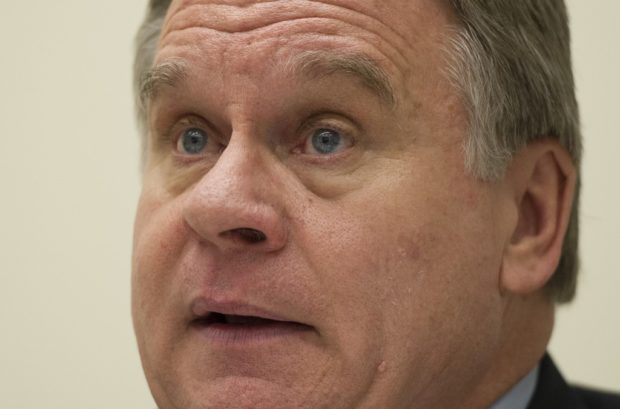China hits top US lawmakers, envoy with sanctions over Xinjiang
BEIJING — China on Monday slapped retaliatory sanctions on three senior Republican lawmakers and a US envoy in a deepening row over Beijing’s treatment of Uighurs in the western Xinjiang region.

This file photo taken on January 16, 2014 shows US Congressman Chris Smith, R-New Jersey. China announced on July 13, 2020 “corresponding sanctions” against three senior Republican lawmakers and a US envoy in retaliation for visa bans and asset freezes on Chinese officials imposed by Washington over Uighur rights abuses. Photo by Jim WATSON / AFP
Some of the most outspoken critics of China — Senators Marco Rubio and Ted Cruz along with Congressman Chris Smith — were targeted by the action, as well as the US ambassador-at-large for international religious freedom, Sam Brownback.
The unspecified “corresponding sanctions” were announced days after the US imposed visa bans and asset freezes on several Chinese officials, including the Communist Party chief in Xinjiang, Chen Quanguo, over rights abuses in the region.
The move was “in response to the US’s wrong actions,” foreign ministry spokeswoman Hua Chunying said at a regular briefing.
“We urge the US to immediately withdraw its wrong decision, and stop any words and actions that interfere in China’s internal affairs and harm China’s interests,” she said.
“China will make a further response depending on the development of the situation.”
Article continues after this advertisementSanctions will also be applied on the US Congressional-Executive Commission on China, an agency that monitors human rights in the Asian country.
Article continues after this advertisementThe two countries have traded barbs and sanctions on a slew of issues since President Donald Trump took office, from trade to more recent spats over the coronavirus pandemic, a security law in Hong Kong, and Chinese policies in the far west regions of Tibet and Xinjiang.
‘Horrific’ abuses
Witnesses and human rights groups say that China has rounded up more than one million Uighurs and other Turkic Muslims in Xinjiang in a vast brainwashing campaign aimed at forcibly homogenising minorities into the country’s Han majority.
Secretary of State Mike Pompeo said last week the United States was acting against “horrific and systematic abuses” in the western region including forced labour, mass detention and involuntary population control.
China rejects the accusations, but it has acknowledged sending Uighurs to “vocational education centres” to learn Mandarin and job skills in a bid to steer them away from terrorism and separatism following a spate of deadly violence in the fractious region.
“I have to point out that Xinjiang affairs are purely China’s internal affairs. The US has no right or basis to interfere,” Hua said on Monday.
China is “unwavering in its determination to fight against forces of violence and terrorism, forces of separatism, and that of religious extremism,” Hua said.
“Its determination to oppose any external forces’ interference in Xinjiang affairs and China’s internal affairs is unwavering as well.”